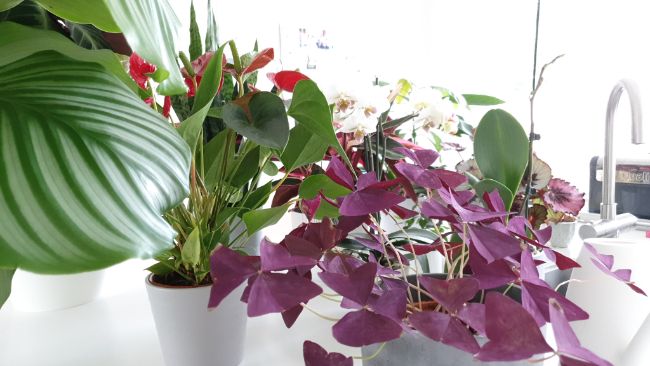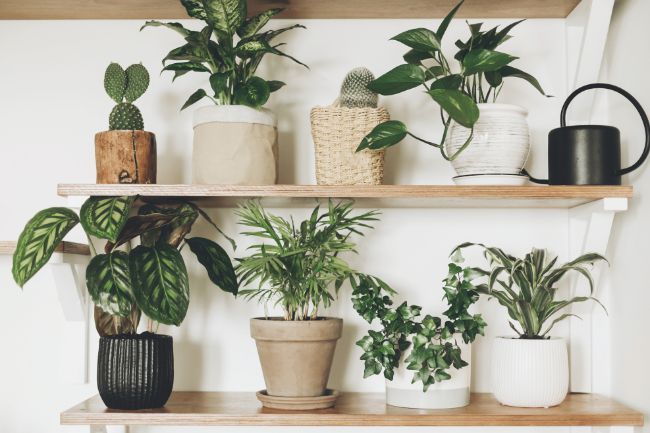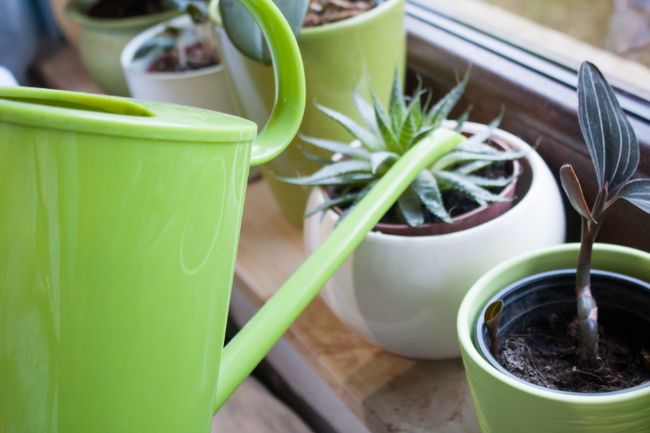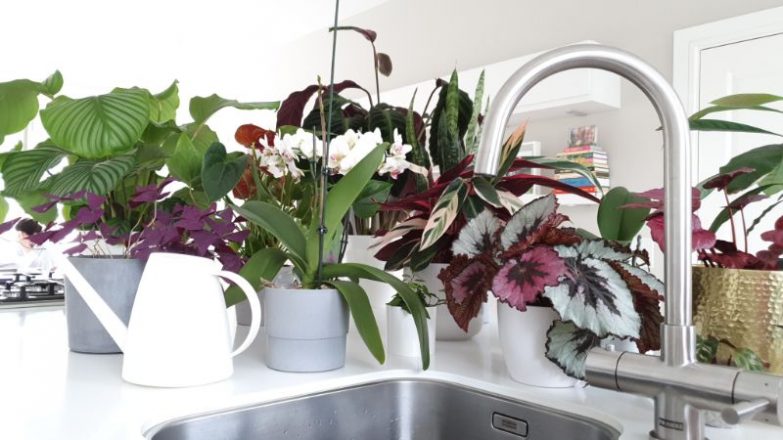It’s pretty safe to say that most people understand that plants need water if you want to keep them alive. But water quality varies massively and can impact the health of your houseplants. So should you use tap water, rainwater, distilled or filtered water for houseplants?
What is the best water for houseplants? Tap water is usually ok for most houseplants, but it depends on the plant and the quality of your tap water. Tap water quality varies, and some plants can be sensitive to minerals and chemicals in tap water. Rainwater or distilled water are excellent alternatives.
This article will explain everything you need to know about water for houseplants, to ensure they remain healthy and looking great.
How Water Quality Impacts Houseplants
Before we talk about the different types of water, it’s important to address the components of water quality that impact houseplants. This will give us some knowledge to understand why different types of water are better than others based on their characteristics.
Hard Water
If you live in a hard water area, you’ll know all about it due to the limescale deposition on your pipes and appliances. Hard water has a high mineral content, largely comprising calcium and magnesium carbonates, bicarbonates and sulfites.
If you live in a hard water area, you’ll know all about it due to the limescale deposition on your pipes and appliances. Hard water has a high mineral content, largely comprising calcium and magnesium carbonates, bicarbonates and sulfites.
These minerals will result in the accumulation of calcium and magnesium salts in the soil and on the sides of pots. Whilst usually harmless, they can build up in the soil over time. This can impact the availability of other nutrients and the pH of the soil, which can have a negative impact on the health of your plants.
if you live in a hard water area, it is a good idea to flush the soil every few months with rainwater, filtered water or distilled water to flush out these salts.
Sodium
Sodium content in water varies substantially, and many plants are intolerant to higher levels. Most tap water has perfectly acceptable levels of sodium, but if you use a water softener at home, this can cause major problems. Water softeners replace troublesome calcium and magnesium ions in hard water with sodium or potassium ions. This eliminates the problems of limescale building up on your pipes and appliances, and is safe to drink for humans.
However, most houseplants absolutely hate high salt levels, so don’t water your plants with water that has run through a water softener. Use rainwater, filtered water, distilled or bottled water instead.

Oxygen Content
Oxygen delivery to the roots of plants is absolutely crucial for the healthy growth of your plants. Planting in well-aerated soil makes a huge difference, and avoiding soggy soil makes a big difference, but the oxygen content of the water you use also makes a big difference to the health of your plants. Research has shown that higher dissolved oxygen within the root zone leads to a larger root mass and faster and more vibrant growth of plants.
Oxygen content is higher in cool water compared to warm water, and is higher in water containing fewer dissolved minerals. Additionally, fresh rain water will generally have higher oxygen levels than any other form of water.
Stunted root growth or signs of root rot are the markers of insufficient oxygen in the soil. Whilst choosing well-aerated soil and adhering to good watering practices will help, changing the type of water you use is another good strategy to try if you are having problems.
Temperature
Whilst water temperature impacts dissolved oxygen content, it is actually more important to ensure that the water you use is not too cold. Some plants, particularly tropical plants such as calatheas, alocasia, ficuses, orchids, etc can be quite sensitive to being watered with cold water.
- At low water temps, the pump mechanisms in the roots aren’t triggered, limiting the absorption of water and nutrients.
- Cold water may also make plants think the seasons are changing to fall/winter and trigger dormancy.
The result of this is that the plant will halt growth, cause damaged roots and result in dropped or damaged leaves.
Chlorine/Chloramines
Chlorine/chloramines can damage roots and kill off beneficial bacteria and other soil microorganisms in the root zone. They can also directly cause toxicity to some more sensitive houseplants, causing brown tips and brown spots on their leaves, or even dropped leaves.
You can eliminate all of the chlorine and a lot of the chloramines by letting the tap water sit uncovered, ideally in bright light for 12-24 hours before using it to water your plants. Alternatively, running the water through a water filter will remove most of this.
Fluoride
Fluoride, even at the small levels found in fluoridated water, can disrupt photosynthesis and respiration within plants. As it builds up in plant tissues it can cause toxicity and necrosis.
Fluoride content varies significantly between tap water sources, and some countries even add supplemental fluoride to the tap water due to the benefits to dental health.
Heavy Metals
Heavy metals quickly reach toxic levels in plants when taken in through the roots, significantly reducing plant growth, resulting in senescence. Most sources of water will have low levels of heavy metals, but if you are sourcing water from a well or local water source, it may be worth testing.
Most people can easily access a water quality report online from their local water authority, or you can even pay to have your home tap water tested to determine the exact amounts of a wide variety of chmicals and minerals in your water.

Different Types Of Water For Houseplants
Whilst tap water will do fine for most plants, there are many other options you can consider. Tap water is usually the easiest option, and will be fine in most situations. The water quality of the other choices will usually be better, but only necessary to maintain plant health in certain circumstances. Let’s look at the options.
To help choose the best type of water for your houseplants let’s talk about the different types of water and the pros and cons of each.
Tap water
For most people, tap water is a staple in their homes, and they give little thought to having access to it. We simply go over to the faucet, turn it on, and have an unlimited supply right at our fingertips. Depending on your location the tap water will either be fed via a well on your property or is supplied through pipes connected to your local water facility.
Tap water can be classified as either “hard” or “soft”, depending on its mineral content. Rainwater is naturally soft, containing few minerals, as it falls; as it works its way into above-ground and underground water sources it picks up minerals such as calcium and magnesium, making it hard. This hard water can be softened again using potassium or sodium ions to replace and eliminate the calcium and magnesium.
Pros Of Tap Water
- Most people have low-cost, or free, access to tap water.
- Water quality standards are set in place to regulate public drinking water supply.
Cons Of Tap Water
- Public drinking water contains chlorine and fluoride in some areas.
- Calcium and magnesium in hard water build up in the potting soil and can create a layer on top that repels water.
- Sodium in soft water can quickly reach levels toxic to plants since it isn’t a plant essential nutrient. When high levels of sodium ions accumulate, it creates a sodic soil that may have problems with water infiltration and alkalinity.
Bottled/Spring water
A common staple in some homes, bottled water is another source of water for houseplants. Water from underground sources works its way to the surface and is then collected for bottling. Depending on the natural mineral content it can be labeled spring water or mineral water.
Pros Of Bottled Water
- Bottled waters may contain minerals such as calcium, magnesium that are needed by plants, depending on the water source.
- They do not contain contaminants, including chlorine and fluoride.
Cons Of Bottled Water
- Price can quickly add up if you have numerous houseplants.
- Plastic containers add to landfills or need to be recycled.
Distilled Water
Distilled water is a type of highly purified water that is free of contaminants and impurities. Water is boiled to create steam/vapor and then condensed back into a liquid to be collected in a separate container.
Pros Of Distilled Water
- Free from minerals (calcium, magnesium, and sodium), using distilled water for your houseplants prevents buildup on the soil surface that may impact water infiltration.
- Peace of mind that there are no harmful chemicals that can impact the health of your plants.
Cons Of Distilled Water
- The distillation process removes minerals such as calcium and magnesium that can be used by plants.
- Higher cost because of the manufacturing/distillation process.
Rainwater
Ah, rainwater…the original source of water for crops and plants.
Pros Of Rainwater
- The only associated expense is collection containers.
- Naturally soft water, containing low concentrations of calcium and magnesium; free of chlorine and fluoride.
Cons Of Rainwater
- Hard to collect in areas with low precipitation levels. It may not be feasible for apartment dwellers or those in highly populated urban areas to collect rainwater.
- Rainwater is naturally slightly acidic, but water collected in areas of high manufacturing may be highly acidic due to pollution and acid rain.
Recommendation For The Best Water For Houseplants
We’ve covered why water quality is important, the components of water that affect plants, and the different types of water. But now let’s get down to choosing the best water for houseplants.
I believe that tap water is fine to use for watering most houseplants. Be aware you may see problems if the plant is overly sensitive, or you live in an area where the tap water has quality concerns such as a particularly high mineral content or contains chlorine, fluoride, or heavy metals.
I suggest using tap water first in most situations and carefully observing for any adverse effects: scorching of leaf tips, necrotic tissue, chlorosis, or a significant buildup of salt on the soil surface that repels water.
If adverse effects are seen and you suspect your water quality is the cause of the problem, then take steps to improve the water quality if feasible, or use rainwater/distilled water and watch for an improvement in the condition of the plant.
Common Questions About Water For Houseplants

What Temperature Water Is Best For Watering Houseplants?
- The best temperature for watering houseplants is between 17 and 22℃ (62 and 72℉), or just about room temperature. At this temperature, water will not cause any cold stress to the roots of the plant and it still contains reasonable amounts of dissolved oxygen for plants. Allow tap water to sit for a couple of hours to adjust to room temp before using it.
Can I Use Hard Water To Water My Houseplants?
- Yes, you can use hard water to water your houseplants. The calcium and magnesium found in hard water are important for plant growth. Periodically flush the topsoil using rainwater, bottled or distilled water to prevent buildup on the soil surface.
Can I Use Tap Water For My Houseplants If I Have A Water Softener?
- It is a better option to use tap water that has not been through your water softener if possible. You can use tap water for your houseplants if it has been through a softener. However, it will contain higher levels of sodium ions so it’s important to watch plants for sodium toxicity, or the formation of a salt “crust” on the top of the soil.
Is Fluoridated Water Safe To Use On My Houseplants?
- Yes, fluoridated water can be safely used on houseplants, but it’s important to watch for toxicity symptoms. Fluoride isn’t needed by plants and can build up in the tissues, impacting photosynthesis and respiration when it reaches toxic levels.
Will Chlorine From Tap Water Damage Houseplants?
- Yes, chlorine from treated tap water can damage houseplants if the levels are too high. To reduce possible impacts from chlorine fill your container with water and allow it to sit uncovered for 24-hours to let the chlorine dissipate naturally.
Are Some Plants More Sensitive To Water Quality?
- Yes, some plants are more sensitive to water quality. Monocots like palms, spider plants, prayer-plants, and dracaenas are more sensitive to high mineral levels, chlorine, and fluoride.

